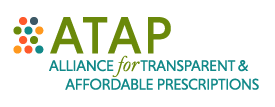ATAP recommends the following policy solutions to improve the affordability of prescription drugs, patient access to treatment, and the ability of physicians to determine the best course of treatment for their patients.
Reforming the Rebate System
The rebate system was intended to generate cost-savings, but asymmetric access to information has enabled PBMs to divert rebates and discounts towards their bottom line rather than defraying costs for plans and patients. Addressing this requires a two-fold approach: (1) mandating transparency to identify how money flows through the system, and (2) requiring a portion of rebates that must flow back to plans for patient cost reductions.
ATAP therefore recommends implementing policies that:
- Establish uniform definitions for terms used in mandated disclosure provisions by specifying what constitutes a rebate, a discount, a fee, an aggregate amount received from a manufacturer, and all other relevant classifications.
Require PBMs to disclose to contracting plan sponsors and appropriate government agencies information regarding the total amount received from a manufacturer for a drug, percentage of that amount designated rebate and/or discount, and the amount passed back to plan sponsors.
Using information received from mandated disclosures, establish minimum percentage of rebates that PBMs must pass on to plan sponsors, taking into account fee reclassification abuses.
Reducing Costs for Patients
ATAP recommends that patient cost-sharing obligations be calculated based off the net price, which takes into account rebates and discounts, rather than list price.
ATAP recommends prohibiting PBMs from: (1) requiring patients to pay for their medications any cost-sharing amount greater than the allowable claim amount submitted by the pharmacist for the medication, or the amount the patient would pay for the medication if he or she purchased it without using a health benefit plan; and (2) including in their contracts with pharmacies “gag clauses” that prohibit the pharmacy or pharmacists from providing information to patients regarding the cost of their medications.
Improving Access to Treatment
ATAP strongly believes that formularies should be constructed based on effectiveness, safety, and ease of administration, not rebates. PBMs must be required to justify all formulary decisions based on accepted clinical standards and information as established in conjunction with the medical community.
ATAP also believes that transparency surrounding PBM formularies and patient cost-sharing obligations is critical to improving a patient’s ability to obtain their medications in a timely and predictable manner. ATAP therefore recommends that PBMs be required to:
Provide easily accessible information on up-to-date, accurate, and complete formulary lists including, but not limited to:
a) Information regarding tiering structures and cost-sharing requirements for each tier, including the dollar amount of any copay or coinsurance.
b) Any restrictions on the manner in which a drug can be obtained, including, but not limited to, quantity limits, dose restrictions, prior authorization requirements, step therapy requirements, and any other utilization management restrictions.
c) Whether the plan has a separate drug deductible or whether the medical deductible applies to prescription drugs.
d) Any network-related limitations or restrictions, including differential cost-sharing, on the location from which a prescription can be filled.
e) The process to secure a drug exceptions or external review request.
2. Notify patients and physicians when formularies are changed at a certain time period prior to such change.
ATAP also believes that formularies based on rebates should not dictate and control a patient’s course of treatment, which should be left up to the patient’s physician. Accordingly, ATAP supports the following policies:
- Requiring PBMs to continue coverage for patients who are medically stable on a medication.
Prohibiting PBMs from making mid-year formulary changes (except when related to safety).
Requiring PBMs to allow physicians to override step therapy protocols when the physician determines it is not in the patient’s best interest or can demonstrate the patient is stable on her current medication.
Requiring PBMs to allow coverage for medication not on formulary if physician provides objective data to support a justifiable, medically indicated cause.
Finally, ATAP recommends that if a PBM requests a substitution be made, the PBM is required to disclose to the plan sponsor, the prescribing physician, and the patient the cost of both drugs and any financial benefit the PBM received as a result of the substitution.
Eliminating Unfair and Deceptive PBM Practices
ATAP believes that unless more regulation and oversight is imposed on PBMs, they will continue to engage in conduct that is deceptive, unfair, and contrary to the best interest of patients.
ATAP recommends that states enact legislation that requires PBMs to register with the insurance department or become licensed as a third-party administrator. This requirement is a vital first step in providing a minimum level of oversight protection for physicians and patients. ATAP further recommends that states impose a fiduciary duty on PBMs or otherwise require them to act in or operate to the best interest of their beneficiaries.
ATAP also believes that the Federal Trade Commission (FTC) has overlooked the anti-competitive behavior in the pharmacy benefit management field, and that the FTC position that lack of transparency is necessary because it drives down prices is based on erroneous assumptions about the drug market. ATAP further believes that it is within the scope of the FTC’s authority and jurisdiction to impose the mandated disclosures regarding the rebate system as detailed above. ATAP thus urges the FTC to reevaluate and more strictly enforce consumer protection statutes and regulations against the largest PBMs, and to demand transparency within the rebate system.
ATAP further supports efforts to regulate and impose transparency standards on PBM payment methodologies to pharmacies and plan sponsors, including the use of MAC lists for generic drugs, and efforts to enact “any willing pharmacy” legislation that prohibits the exclusion of qualifying pharmacies from a PBM pharmacy network.
